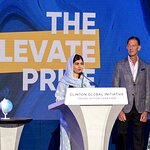During her visit to Nigeria, education activist Malala Yousafzai met this week with girls displaced by the Boko Haram crisis.

Credit/Copyright: UNICEF/FatiAbubakar/2017
While in Maiduguri, the epicenter of the crisis in northeast Nigeria, Malala visited schoolchildren in a camp for displaced families and secondary school girls at Yerwa Government Girls School.
“Nigeria is the richest country in Africa, but has more girls out of school than any country in the world,” said Yousafzai. “Studies are clear — educating girls grows economies, reduces conflict and improves public health. For these girls and for their country’s future, Nigeria’s leaders must immediately prioritise education.”
Over 2,295 teachers have been killed and 19,000 displaced, and almost 1,400 schools destroyed since the start of the Boko Haram insurgency in 2009. Three million children in the northeast are in need of support to keep learning.
While the 90 camps and camp-like settings in Maiduguri house thousands of families, more than three-quarters of the 600,000-plus displaced people are living with family, relatives or friends in host communities, placing an additional burden on local schools.
Beyond the crisis in the northeast, Nigeria already had the largest number of children out of school in the world – over 10.5 million. Among primary school-aged children not in school, only five per cent are dropouts: three-quarters of them will never step foot in a classroom, and the majority are girls.
Across West Africa, 46 per cent of primary school-aged children not in school are Nigerian. Globally, one in five children not enrolled are Nigerian.
“We will do everything in our power to make sure all children can keep learning. We believe that education – especially for girls, is the single most important way to bring hope, peace and prosperity not just for this generation, but for also for future generations,” said Mohamed Malick Fall, UNICEF’s Representative in Nigeria.
UNICEF is working closely with the government and partners to put children in the northeast back into learning environments. More than 525,000 have been enrolled in school this year alone, over 37 temporary learning spaces established, and almost 92,000 packs of learning material distributed to help children continue their education.
UNICEF’s education response in the northeast remains critically underfunded, with just 54 per cent of the $31.4 million appeal received, leaving a funding gap of $14.4 million.





